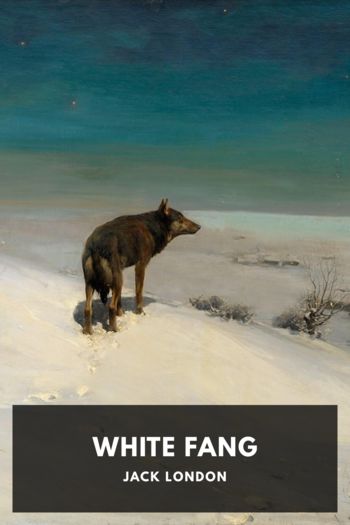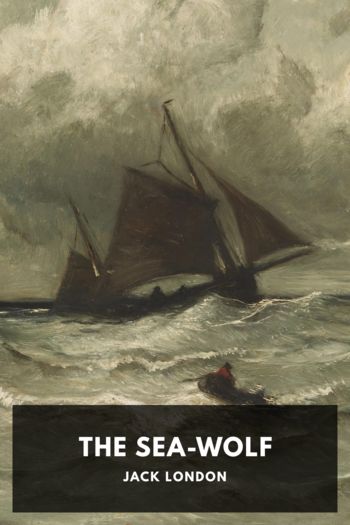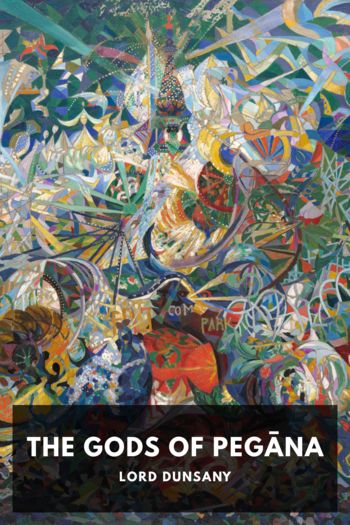White Fang by Jack London (good book recommendations txt) 📕

- Author: Jack London
Book online «White Fang by Jack London (good book recommendations txt) 📕». Author Jack London
When Mit-sah cried out his command for the team to stop, White Fang obeyed. At first this caused trouble for the other dogs. All of them would spring upon the hated leader only to find the tables turned. Behind him would be Mit-sah, the great whip singing in his hand. So the dogs came to understand that when the team stopped by order, White Fang was to be let alone. But when White Fang stopped without orders, then it was allowed them to spring upon him and destroy him if they could. After several experiences, White Fang never stopped without orders. He learned quickly. It was in the nature of things, that he must learn quickly if he were to survive the unusually severe conditions under which life was vouchsafed him.
But the dogs could never learn the lesson to leave him alone in camp. Each day, pursuing him and crying defiance at him, the lesson of the previous night was erased, and that night would have to be learned over again, to be as immediately forgotten. Besides, there was a greater consistence in their dislike of him. They sensed between themselves and him a difference of kind—cause sufficient in itself for hostility. Like him, they were domesticated wolves. But they had been domesticated for generations. Much of the Wild had been lost, so that to them the Wild was the unknown, the terrible, the ever-menacing and ever warring. But to him, in appearance and action and impulse, still clung the Wild. He symbolised it, was its personification: so that when they showed their teeth to him they were defending themselves against the powers of destruction that lurked in the shadows of the forest and in the dark beyond the campfire.
But there was one lesson the dogs did learn, and that was to keep together. White Fang was too terrible for any of them to face single-handed. They met him with the mass-formation, otherwise he would have killed them, one by one, in a night. As it was, he never had a chance to kill them. He might roll a dog off its feet, but the pack would be upon him before he could follow up and deliver the deadly throat-stroke. At the first hint of conflict, the whole team drew together and faced him. The dogs had quarrels among themselves, but these were forgotten when trouble was brewing with White Fang.
On the other hand, try as they would, they could not kill White Fang. He was too quick for them, too formidable, too wise. He avoided tight places and always backed out of it when they bade fair to surround him. While, as for getting him off his feet, there was no dog among them capable of doing the trick. His feet clung to the earth with the same tenacity that he clung to life. For that matter, life and footing were synonymous in this unending warfare with the pack, and none knew it better than White Fang.
So he became the enemy of his kind, domesticated wolves that they were, softened by the fires of man, weakened in the sheltering shadow of man’s strength. White Fang was bitter and implacable. The clay of him was so moulded. He declared a vendetta against all dogs. And so terribly did he live this vendetta that Grey Beaver, fierce savage himself, could not but marvel at White Fang’s ferocity. Never, he swore, had there been the like of this animal; and the Indians in strange villages swore likewise when they considered the tale of his killings amongst their dogs.
When White Fang was nearly five years old, Grey Beaver took him on another great journey, and long remembered was the havoc he worked amongst the dogs of the many villages along the Mackenzie, across the Rockies, and down the Porcupine to the Yukon. He revelled in the vengeance he wreaked upon his kind. They were ordinary, unsuspecting dogs. They were not prepared for his swiftness and directness, for his attack without warning. They did not know him for what he was, a lightning-flash of slaughter. They bristled up to him, stiff-legged and challenging, while he, wasting no time on elaborate preliminaries, snapping into action like a steel spring, was at their throats and destroying them before they knew what was happening and while they were yet in the throes of surprise.
He became an adept at fighting. He economised. He never wasted his strength, never tussled. He was in too quickly for that, and, if he missed, was out again too quickly. The dislike of the wolf for close quarters was his to an unusual degree. He could not endure a prolonged contact with another body. It smacked of danger. It made him frantic. He must be away, free, on his own legs, touching no living thing. It was the Wild still clinging to him, asserting itself through him. This feeling had been accentuated by the Ishmaelite life he had led from his puppyhood. Danger lurked in contacts. It was the trap, ever the trap, the fear of it lurking deep in the life of him, woven into the fibre of him.
In consequence, the strange dogs he encountered had no chance against him. He eluded their fangs. He got them, or got away, himself untouched in either event. In the natural course of things there were exceptions to this. There were times when several dogs, pitching on to him, punished him before





Comments (0)